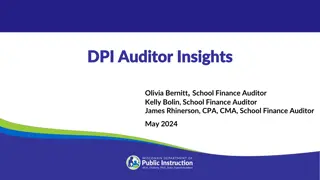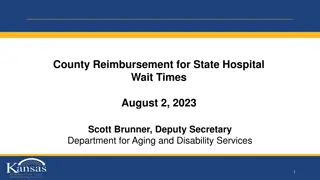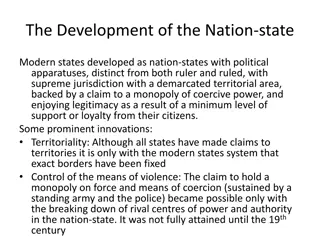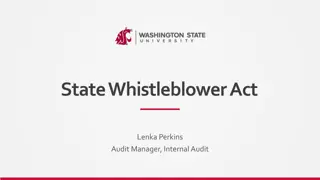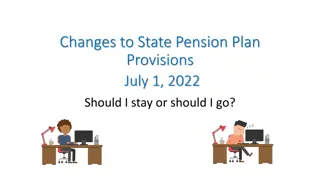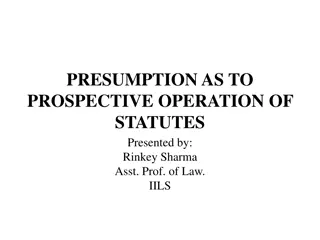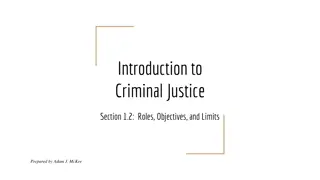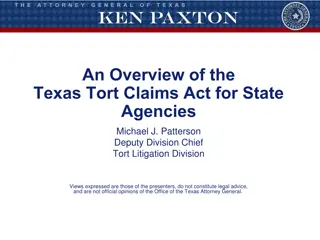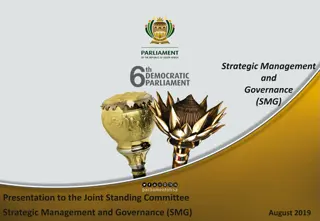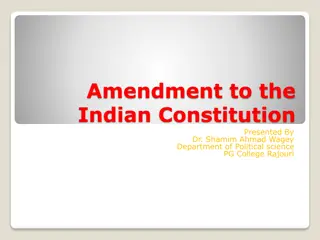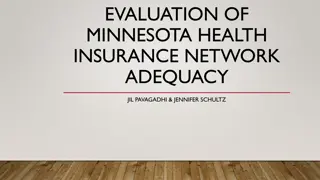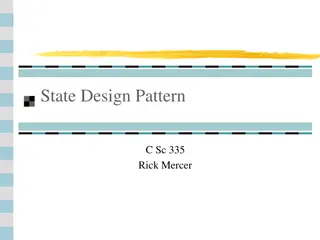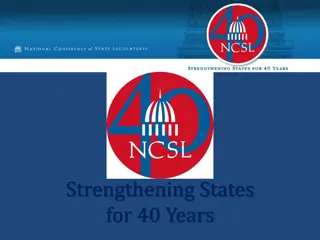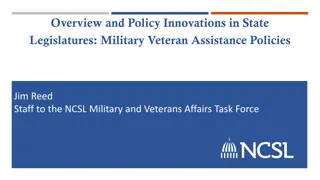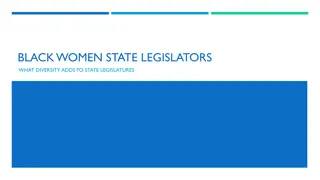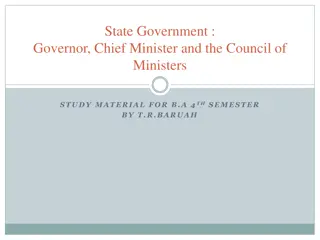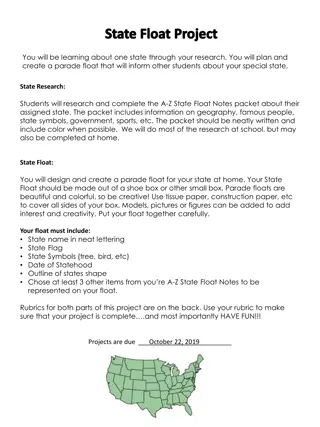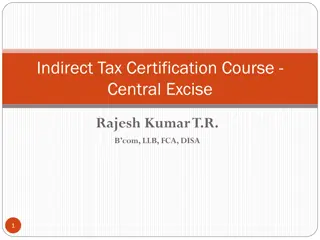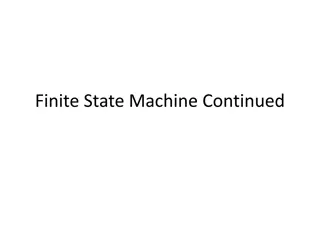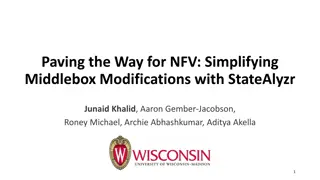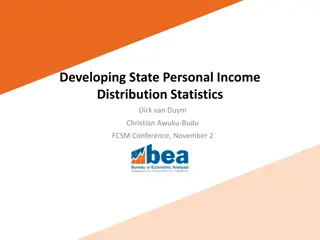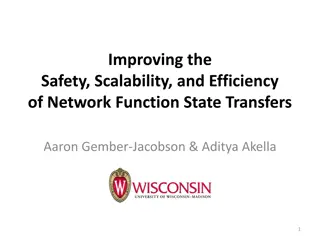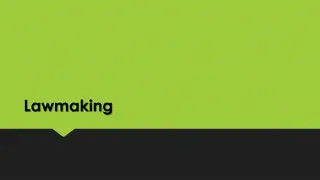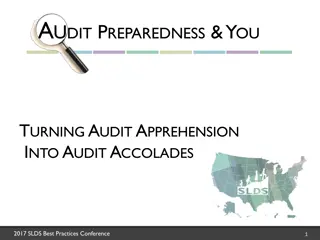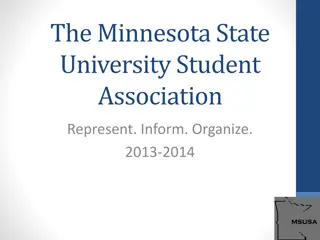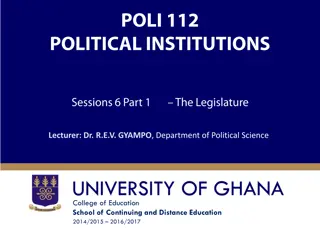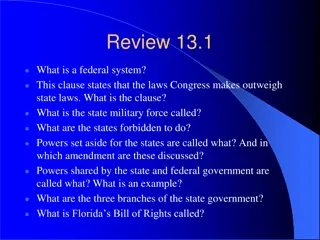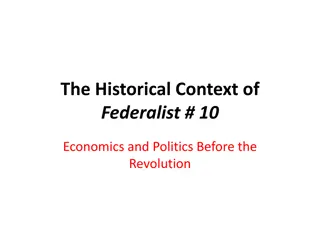Mid-Year Assessment 2023/2024: Financial Management of Parliament Presentation
Presentation to the Joint Standing Committee on Financial Management of Parliament for the Mid-Year Assessment 2023/2024. The assessment covers purposes, progress review, human resources, governance, financial assessment, insights, lessons learned, and recommendations for the second half of the year
4 views • 64 slides
Possible Analog States of the Hoyle State in Heavier Nuclei
Research conducted at the National Research Centre, Kurchatov Institute, explores possible analogs of the Hoyle state in heavier 4N nuclei, focusing on the 7.65 MeV 0+2 state in 12C (Hoyle state). The study reveals insights into the structure and characteristics of the Hoyle state, crucial for under
0 views • 12 slides
DPI Auditor Insights and State Audit Guidelines Overview
This collection of images and descriptions provides insights into DPI Auditor activities, state audit guidelines, and updates related to state major program determinations. The State Single Audit Guidelines for Wisconsin School Districts are highlighted, along with the State Audit Manual overview an
3 views • 36 slides
State Hospital Reimbursement Programs Overview
State legislatures in 2023 passed SB 228 and HB 2184 directing KDADS to reimburse counties, healthcare providers, law enforcement, and other entities for costs related to holding individuals in custody, observation, and transportation. SB 228 focuses on competency examination and treatment for defen
1 views • 19 slides
Employee Rights in Colorado State Classified System
The State Personnel System in Colorado provides certain rights and protections for employees in state classified positions, including appeal and grievance rights. Classified employees must adhere to employment laws and are safeguarded against discrimination, retaliation, and harassment. Various fede
0 views • 72 slides
The Historical Significance of the First Islamic State in Medina
The Islamic State in Medina established by Prophet Muhammad marked the beginning of a new era in Islamic history. It was the first welfare state, where divine teachings were implemented under his guidance. This state pioneered the integration of spiritual and temporal authorities, setting the founda
0 views • 60 slides
Evolution of the Nation-State and Modern State Concepts
The development of the nation-state marks a significant shift in political organization, characterized by centralized power, territoriality, and legitimacy gained through citizen support. Key innovations include territorial demarcation, monopolization of coercion, impersonal power structures, and th
0 views • 8 slides
Overview of State Whistleblower Act in Washington State
The State Whistleblower Act in Washington State, governed by the Revised Code of Washington (RCW) 42.40, provides a mechanism for state employees to report improper governmental actions. The Act aims to encourage whistleblowers to come forward, prohibits retaliation, and authorizes remedies for viol
0 views • 28 slides
State Pension Plan Provisions Changes Effective July 1, 2022
The 2017 collective bargaining agreement between the State and the State Employees Bargaining Coalition introduced changes to retirement terms for state employees, affecting members of the State Employees Retirement System (SERS) and the Alternate Retirement Plan (ARP). Changes include adjustments t
5 views • 15 slides
Principles of Prospective Operation of Statutes in Legislation
Jurisprudence upholds the rule against retrospective legislation to protect settled matters and individual rights. The presumption is that laws should be prospective to avoid disrupting existing legal relationships. However, legislatures possess the power to enact retrospective laws, subject to cert
0 views • 16 slides
Understanding the Roles in Criminal Justice System
The criminal justice system involves three branches of government, each with specific responsibilities, operating at federal, state, and local levels. Law enforcement is primarily a local government function, while legislatures determine criminal laws and punishments. Statutes organized into codes d
0 views • 35 slides
Understanding the Texas Tort Claims Act for State Agencies
The Texas Tort Claims Act (TTCA) outlines the scope of tort liability for State entities and employees during their state employment. State entities are represented by the Office of the Attorney General, and specific provisions apply to state entities separate from municipalities. This overview cove
0 views • 16 slides
Strategic Management and Governance Division Overview
The Strategic Management and Governance (SMG) Division plays a vital role in enhancing decision-making, promoting good corporate governance, facilitating strategy execution, and driving innovation within the institution. By fostering collaboration and teamwork among its components, the division aims
0 views • 23 slides
Amendment Process in the Indian Constitution: Overview and Procedure
Amending the Indian Constitution is a crucial process outlined in Article 368. It is designed to maintain the sanctity of the Constitution and prevent arbitrary power. The process involves introducing a Bill, passing it with required majorities in both Houses of Parliament, ratifying by state legisl
2 views • 7 slides
The Swaraj Party: Formation, Background, and Aims
The Swaraj Party, a breakaway group from the Indian National Congress, was formed in 1923 by C.R. Das and Motilal Nehru following the withdrawal of the Non-Cooperation Movement. The party aimed for dominion status, autonomy, and self-rule, emphasizing control over bureaucracy and local bodies. The s
0 views • 12 slides
Analysis of Clocked Sequential Circuits and Parity Checkers
This chapter delves into the analysis of clocked sequential circuits, focusing on topics such as sequential parity checkers, signal tracing, state tables and graphs, and models for sequential circuits. It covers concepts like Mealy and Moore machines, state equations, state graphs, timing charts, an
0 views • 38 slides
Evaluation of Minnesota Health Insurance Network Adequacy Study
The evaluation assessed the network adequacy of health insurance in Minnesota, focusing on specific provider specialties and types. Results showed that about 41% of plans were considered insufficient, with key providers lacking in certain specialties. The approach involved data standardization, anal
0 views • 11 slides
Understanding the State Design Pattern in Software Development
The State Design Pattern is a Behavioral pattern similar to Strategy, allowing objects to change behavior based on internal state changes. This pattern involves defining different states and their implementations to control object behavior dynamically. Real-life examples like managing mood states an
0 views • 14 slides
Understanding Rulemaking and Regulations
Rulemaking is the process by which agencies create rules and regulations to implement or interpret laws. It can have the same effect as statutes passed by legislatures. This modern process, encouraged by federal courts, aims to simplify litigation. Rules are statements with general applicability tha
0 views • 22 slides
State Legislatures and Governance: An Overview
National Conference of State Legislatures (NCSL) supports state legislators and staff, covering various policy areas and offering resources like research, training, and opportunities for idea exchange. State legislatures vary in size, session lengths, and rules. States are controlled by Republicans,
0 views • 22 slides
State Legislatures Military Veteran Assistance Policies Overview
State legislatures play a crucial role in enacting policies to support military veterans and their families. Approximately 250 bills are passed annually, addressing a wide range of issues from expediting licenses for veterans to mental health initiatives. Innovations such as Green Alert programs and
0 views • 6 slides
Importance of Diversity in State Legislatures
Legislatures with higher proportions of women and minorities tend to sponsor and pass legislation that caters to the interests of underrepresented groups. However, the marginalization of women and minority legislators by their white male colleagues can limit their influence in policymaking. Intersec
0 views • 12 slides
Understanding Thomas Hobbes' Leviathan: State of Nature, Natural Laws, and Commonwealth
Thomas Hobbes explores the state of nature, natural laws, and the formation of the commonwealth in his work Leviathan. He discusses the equality of men, causes of conflict in the state of nature, and the transition out of this chaotic state towards civil society under a monarchy. According to Hobbes
0 views • 15 slides
Role of Governor, Chief Minister, and Council of Ministers in State Government in India
The Governor, Chief Minister, and Council of Ministers play crucial roles in the state government of India. The Governor acts as the constitutional head of the state, exercising executive, legislative, financial, judicial, and discretionary powers. The Chief Minister leads the Council of Ministers r
0 views • 7 slides
State Float Project: Research and Create a Parade Float
Engage in a project to learn about a chosen state through research and the creation of a colorful parade float. Students will gather information on geography, famous people, state symbols, and more, neatly compiling it in a packet. Subsequently, they will design a float showcasing the state name, fl
0 views • 16 slides
Understanding Indirect Taxation in India: Insights and Constitutional Aspects
Delve into the world of indirect taxation in India through an exploration of revenue streams, budget estimates, tax structures, and constitutional aspects. Discover how Parliament and State Legislatures have exclusive powers to make tax laws, in accordance with Article 265 of the Constitution of Ind
0 views • 88 slides
Understanding Political Party Funding Act of 2018
The Political Party Funding Act of 2018 regulates the funding of political parties in South Africa, ensuring equitable and proportional funding for parties participating in national and provincial legislatures. The Act defines various terms such as donations, foreign persons, and political parties,
0 views • 42 slides
Understanding Finite State Machines in Digital Logic Design
Finite state machines play a crucial role in digital logic systems, allowing for the implementation of sequential circuit designs. These machines consist of states and transition functions, determining system behavior based on inputs and current state. The output function generates outputs based on
0 views • 35 slides
Simplifying Middlebox Modifications with NFV State Management
Paving the Way for NFV explores how Network Function Virtualization (NFV) simplifies middlebox modifications through state analysis and management. The process involves creating or updating state in middleboxes for various connections, utilizing frameworks for transferring live state, and addressing
0 views • 22 slides
Developing State Personal Income Distribution Statistics
This project aims to create a distributional account for State Personal Income, allowing for the analysis of inequality by state and over time. Using various data sources such as BEA aggregates and IRS statistics, the distributional model provides insights into state-level income inequality. Census
0 views • 17 slides
Travel Policy Changes at Pittsburg State University
Pittsburg State University is implementing new travel policy changes effective January 1, 2016, aligning with federal standards for per diem rates. The changes are a result of the State of Kansas adopting federal rates and will impact all travel occurring after the specified date. The policy update
0 views • 21 slides
Understanding State Aid Regulations in the EU Post-Brexit
State aid regulations play a crucial role in ensuring fair competition within the EU. Post-Brexit, the UK is likely to still be bound by these rules. State aid is defined as any form of aid granted by a Member State that distorts competition, posing challenges for trade between Member States. The EC
0 views • 18 slides
Enhancing Network Function State Transfers
Explore methods to improve the safety, scalability, and efficiency of network function state transfers. Addressing issues related to NF deployments, state management frameworks, and transfer mechanisms. Discuss challenges like safety, efficiency, and scalability with solutions such as re-routing flo
0 views • 16 slides
Understanding the Hierarchy of Lawmaking in Government
Laws are made through legislatures at different levels of government, including federal, state, and local bodies. Each level has varying degrees of power and scope in creating and enforcing laws. In case of conflicting laws between state and federal governments, the Supremacy Clause of the Constitut
0 views • 21 slides
Student Privacy Laws and Best Practices in Education Sector
Legislatures across various states are actively introducing and considering new student privacy laws, focusing on safeguarding online personal information and enhancing data transparency and security. Key themes include the introduction of privacy bills, the passing of data privacy laws, and the est
0 views • 30 slides
Minnesota State University Student Association: Empowering Students for a Better Future
Established in 1967, the Minnesota State University Student Association (MSUSA) represents over 70,000 state university students, aiming to bring students' voices to decision-makers. With a budget of $760,000, MSUSA plays a crucial role in advocating for students' needs and influencing policies at t
0 views • 13 slides
State Machine Abstraction for Dynamic Network Actions in SDN
State machines are proposed as a new switch primitive in Software-Defined Networking (SDN) to facilitate dynamic actions at switches. This approach eliminates the need for a priori knowledge, reduces delays, and enables local state-based policies such as stateful firewall, FTP monitoring, and large
0 views • 6 slides
Understanding Legislatures: Types, Functions, and Processes
Explore the structure and functions of legislatures, including the types such as unicameral and bicameral, unitary and federal legislatures, and the key functions like representation, legislation, financial control, and policy formulation. Delve into the law-making process and the role of parliament
0 views • 14 slides
Overview of State Government and State Legislatures in Florida
A federal system is a political framework where power is divided between a central government and individual states. In this system, laws created by Congress take precedence over state laws. The supremacy clause enforces this hierarchy. States are prohibited from actions like declaring war or mintin
0 views • 12 slides
Colonial Economics and Politics Before Revolution
The historical context of Federalist #10 delves into the colonial economy and politics preceding the American Revolution. It explores the diverse economic activities in different colonies such as Virginia, the Carolinas, Georgia, and New England. Additionally, the fluid social classes, bicameral leg
0 views • 7 slides


